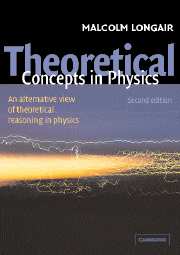Book contents
- Frontmatter
- Contents
- Preface and acknowledgements
- 1 Introduction
- Case Study I The origins of Newton's laws of motion and of gravity
- Case Study II Maxwell's equations
- Case Study III Mechanics and dynamics – linear and non-linear
- Case Study IV Thermodynamics and statistical physics
- Case Study V The origins of the concept of quanta
- Case Study VI Special relativity
- Case Study VII General relativity and cosmology
- Index
Case Study V - The origins of the concept of quanta
Published online by Cambridge University Press: 05 June 2012
- Frontmatter
- Contents
- Preface and acknowledgements
- 1 Introduction
- Case Study I The origins of Newton's laws of motion and of gravity
- Case Study II Maxwell's equations
- Case Study III Mechanics and dynamics – linear and non-linear
- Case Study IV Thermodynamics and statistical physics
- Case Study V The origins of the concept of quanta
- Case Study VI Special relativity
- Case Study VII General relativity and cosmology
- Index
Summary
Quanta and relativity are phenomena of physics which are quite outside our everyday experience – they are also perhaps the greatest discoveries of twentieth-century physics. In the debate between those supporting the Copernican and geocentric models of the Universe, discussed in Chapter 3, one of the issues raised by opponents of the Copernican picture concerned ‘the deception of the senses’: if these phenomena are of such fundamental importance, why are we not aware of them in our everyday lives? Quanta and relativity were both discovered by very careful experiment, the results of which could not be accounted for within the context of Newtonian physics. Indeed, these phenomena are arguably ‘non-intuitive’, and yet they lie at the foundations of the whole of modern physics.
In this case study, we will study in some detail the origins of the concept of quanta. For me, this is one of the most dramatic stories in intellectual history. It is also very exciting and catches the flavour of an epoch when, within 25 years, physicists' view of nature changed totally and completely new perspectives were opened up. The story illustrates many important points about how physics and theoretical physics work in practice. We find the greatest physicists making mistakes, individuals having to struggle against the accepted views of virtually all physicists, and, most of all, a level of inspiration and scientific creativity which I find dazzling. If only everyone, and not only those who have had a number of years training as physicists or mathematicians, could appreciate the intellectual beauty of this story.
- Type
- Chapter
- Information
- Theoretical Concepts in PhysicsAn Alternative View of Theoretical Reasoning in Physics, pp. 281 - 282Publisher: Cambridge University PressPrint publication year: 2003

